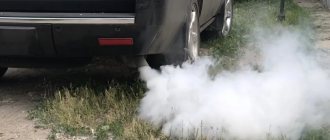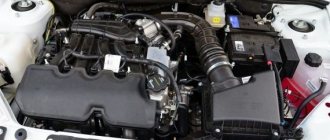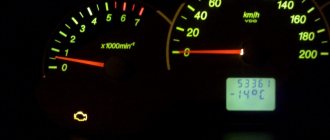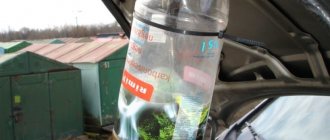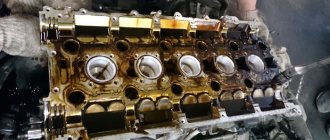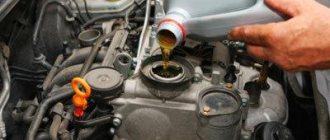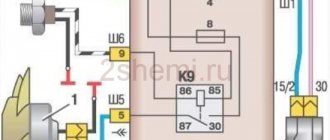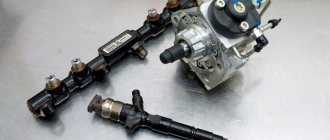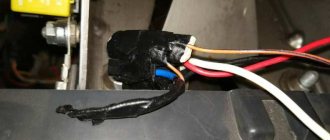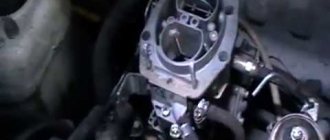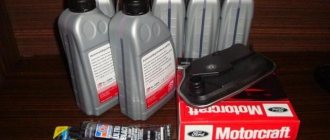During operation, a gasoline internal combustion engine produces sounds characteristic of a diesel engine. The causes of this phenomenon and the dangers associated with it. How to determine the malfunction. Tips and tricks.
A normally working mechanism is said to work like a clock. The gasoline engine of a passenger car that has just left the passenger compartment really justifies this comparison. However, the time comes when the driver notices a changed nature of the engine.
The accompanying sound becomes rougher, extraneous noises and knocks appear, the engine runs unevenly, with vibrations. Since this sounds aurally reminiscent of the operation of a diesel engine, they often call it a “diesel engine”. Moreover, this may not necessarily happen on an old car. The article discusses the factors that contribute to this behavior of the engine.
Ignition system malfunctions
As mentioned above, low-quality gasoline has a detrimental effect on the operation of spark plugs. However, even when using good fuel, do not forget about replacing them regularly. Previously, spark plugs were most often changed when the engine began to clearly lose its dynamic qualities or have difficulty starting.
Today, most manufacturers recommend in service books to replace spark plugs annually or after 15 - 20 thousand kilometers. In this case, they are not the cause of deterioration in engine performance. However, you can buy defective products, and then signs of their poor performance will appear, including misfires.
Therefore, you should not buy cheap candles from an unknown manufacturer - the savings may backfire. Missing sparks can also be caused by the ignition distributor and the high-voltage part of this system: wires and coils.
What to do if the diesel engine is filled with gasoline
Let's start with the fact that among experienced domestic diesel drivers there is a method when truck drivers deliberately add gasoline to diesel fuel in winter. This is done so that the fuel does not lose its fluidity. Fill in gasoline so that its amount does not exceed 8-10% of the total amount of fuel in the tank.
For this reason, there is a misconception that a small amount of gasoline will not harm a diesel engine. Let us immediately note that for a Soviet tractor or KamAZ this is real. As for the diesel engine of a modern truck or car, then such methods cannot be resorted to.
Foreign manufacturers even indicate that if the diesel engine was filled with gasoline, the engine then started and the car moved, then the following actions are necessary:
- complete removal of fuel from the tank;
- checking the booster pump race for metal shavings;
- if there are no chips, drain the fuel from the fuel supply system;
- carry out a complete flushing of the power system according to the manufacturer’s recommendations;
- replace fuel filters;
The presence of chips, which is detected by a magnet, will require replacement of the entire diesel engine power system: injection pump, injectors, fuel filters, fuel tank, etc.
Now let's get back to the practical situation. If you fill up with gasoline and the diesel car does not start, then it is quite possible to get rid of it by flushing the fuel system and replacing the filters. Don't try to start the engine again! Immediately call a tow truck to quickly transport the car to a service station.
It will be necessary to dismantle and drain the fuel tank, replace filters, and flush the fuel system. As practice shows, these actions are sufficient and costly repairs can be avoided. If you have driven a certain distance after refueling and stalled, after which the engine will no longer start again, then two scenarios are likely:
- flushing the diesel power system;
- replacement of the power system or its individual elements;
Everything will directly depend on how much damage gasoline has caused to fuel equipment. If after refueling there is a sharp drop in engine power, rough operation of the diesel engine and other symptoms noted above, then there is a high probability of driving on a mixture of gasoline and diesel fuel. In this case, it is necessary to immediately stop driving the vehicle, turn off the engine and take appropriate measures to properly diagnose, flush and/or repair the power system.
Problems with the cylinder-piston group
If the engine suddenly and distinctly knocks, knocks, pops, friction and crunching are heard, then operating the car is strictly prohibited. It is necessary to immediately determine the cause of the knocking. In some cases, it will be preferable to abandon the decision to go to a car service under your own power and deliver the vehicle in a tow or tow truck. A low knocking sound at the bottom of the engine crankcase, which intensifies when the engine is under load and when the crankshaft speed increases, may indicate that the main bearings are knocking. When this sound occurs, the engine must be turned off immediately. Main bearings may knock due to critically low oil pressure in the lubrication system. Additionally, the emergency lamp on the instrument panel lights up and does not go out. You can't drive under your own power with that kind of noise.
Glow plugs, relays and control unit
BMW 5 series Logbook Idling, unstable engine operation
It happens that the battery is charged, the starter confidently turns the crankshaft, but the diesel engine still does not start. The problem may be a faulty glow plug. The fuel that enters the diesel cylinders is additionally heated. The diesel fuel in the cylinders is heated by the glow plugs of a diesel engine.
These spark plugs make starting a cold engine easier. The glow plugs are powered through a relay and have a control unit (timer) that controls the heating of the plugs taking into account a given amount of time. After a certain operating time, the relay stops supplying voltage to the glow plugs. In some engines, glow plugs heat diesel fuel until the diesel engine reaches operating temperature completely.
Malfunction of glow plugs does not always occur. A cold diesel engine can start normally in warm weather, as well as “hot” if one or even two spark plugs fail.
With the onset of cold weather, starting a diesel engine with one non-working glow plug is very difficult, but possible. After starting, such a motor will work unstably until it warms up. To check the glow plugs, they are first unscrewed. Next you need to measure their resistance.
Problems can be associated not only with the spark plugs, but also with the glow plug relay. During normal operation, the relay makes quiet clicks when the key is turned in the ignition before starting. The electronic unit that controls the spark plugs may also be faulty. If the characteristic clicks of the relay are not noticed when you try to start the diesel engine, then a malfunction of the relay or unit is likely.
How to fix the problem
Each specific case has its own algorithm of actions. If it is determined that the rumble is a consequence of using low-quality oil, you just need to switch to another fuel oil. It should be remembered that it is inadmissible to use oil without changing it for a long time. The same applies to broken hydraulic compensators, valves and camshafts.
Extraneous sounds due to timing belt faults
Timing problems can also cause a gasoline engine to operate like a diesel engine. Most often, the gas distribution mechanism begins to make obvious noise for two reasons:
- valves are knocking;
- hydraulic compensators are knocking;
The knocking of valves is clearly distinguishable against the general background and has a “metallic” ringing sound. This sound is localized in the cylinder head area, above the valve area. A knocking noise is clearly audible at low and medium crankshaft speeds. It is not recommended to drive for a long time with knocking valves, but getting to the service station on your own is quite possible.
Article on the topic: Car roof rack - install it yourself
As for the hydraulic compensators, their knocking is clearly distinguishable “when cold” and the sound resembles the operation of a well-warmed-up diesel engine. Hydraulic compensators may knock a little on a fully functional gasoline engine in the first minutes after starting, thus layering on the characteristic “clicking” sound of the operating injectors of an injection engine. With the onset of even slight warming up, the sound similar to the operation of a diesel engine should become less intense, and completely disappear at operating temperatures.
If this does not happen, then the reason may be unsuitable engine oil, problems with oil pressure in the lubrication system of a gasoline engine, etc. The failure of only one hydraulic compensator will be manifested by a distinct metallic knock “when hot” in the area of the valve cover. The sound can be either constant or occurring periodically. Most often, the hydraulic compensator knocks at the same level in terms of sound intensity; the rhythm will change in the same way as the crankshaft rotation speed changes.
Other reasons
The appearance of “diesel” sounds is influenced by malfunctions in other engine systems. Incorrect cooling operation leads to the fact that the engine temperature does not reach the optimal value for the normal flow of the working process in the cylinders. In this case, the thermal gaps exceed the design ones, which causes additional noise from the contact of interacting parts.
If the oil pressure in the lubrication system is insufficient, the conditions for the formation of an oil wedge in bearings operating in hydrodynamic lubrication mode worsen. The consequence is a rougher interaction of the working journals of the crankshaft and camshaft with their beds.
There are other reasons, sometimes quite rare. For example, after overcoming a deep muddy rut, the space between the oil pan and its metal protection becomes clogged with liquid mud. After the car has been parked overnight, this dirt dries up, and the driver, when starting the engine in the morning, is quite puzzled by the unexpected vibration of the engine unit.
This fever is accompanied by knocking noises reminiscent of the work not even of a diesel engine, but of a construction hammer. It is difficult to discover the cause. It turns out that dried dirt interferes with the damping of torsional vibrations of the engine, and the latter are transmitted to the body of the car, causing vibrations and frequent knocking.
Summarizing the above, we can conclude: there are many reasons why sometimes a gasoline engine works like a diesel engine. Among them there are both harmless and very dangerous, which, if timely measures are not taken, can lead to breakdown of the power unit. Therefore, do not ignore any extraneous noises and sounds that are unusual for the operation of a gasoline engine.
Exhaust system leaking
The exhaust system can reproduce the richest sound gamut. Thanks to constructive measures, developers achieve a noble exhaust sound character.
However, the consequences of winter operation lead to the fact that one day you will hear a rattling sound from the muffler of your car, reminiscent of the exhaust of a direct-flow muffler. From now on, all street racing fans will perceive this sound as an invitation to compete at the traffic lights.
The reason that the engine rumbles like a diesel engine is a leak in one or another element of the exhaust system. All of its components can burn out: the main and additional mufflers, the resonator, the catalytic converter of the exhaust gases, the corrugation, the exhaust pipe (pants) and the exhaust manifold gasket.
Before reaching this state, a small fistula appears through which gases escape (the leaky part “cuts,” as drivers say). Finding the location of the damage is often difficult, so the hole gradually increases until listening to the lion's roar of the exhaust becomes unbearable.
Sometimes there is no external damage, but the tractor sound is present. This happens when you knock out burnt ceramic honeycombs from the catalyst and drive with such an “improvement”.
Possible problems
No car is insured against any kind of breakdown. But among them there are problems that you can eliminate yourself, but there are also quite serious problems that can only be repaired at a service station.
When you hear extraneous engine noise, you begin to imagine all sorts of reasons, trying to eliminate them yourself. Sometimes, you can involve friends who are well versed in the design and repair of a car. Most common problems:
- in case of malfunctions in the thermostat or gas distribution system, it leads to the engine operating like a diesel engine;
- in case of malfunctions in the ignition system;
- problems with the carburetor;
- problems with the electrical or power system;
- When using low-octane fuel, engine operation resembles the operation of a tractor.
Refueling with low-quality fuel
Many systems and devices of the power unit can contribute to the fact that a gasoline engine operates like a diesel engine. However, there is one external reason that contributes to the appearance of unusual sounds. This is low-quality fuel.
The main property of gasoline, which characterizes its resistance to detonation (explosive pre-ignition), is the octane number. If the engine is designed for AI-95 gasoline, and at the gas station you were filled with low-octane fuel, troubles are inevitable.
- Under certain loads, fuel detonation occurs, accompanied by detonation knocks reminiscent of the ringing of piston pins and, remotely, the sound of a running diesel engine.
- To increase the octane number, octane-increasing additives are added to low-grade gasoline, which are deposited in the nozzles of the working injectors on an injection engine. The supply of fuel to different cylinders becomes uneven, which leads to harsh engine operation. In advanced cases, the injectors become completely clogged, as a result of which the engine begins to “trouble.”
- The additives contained in “bodied” gasoline cover the electrodes of the spark plugs with a layer of red soot, and due to misfires, the engine again “troubles.”
Tip: try to refuel at chain gas stations located in large populated areas or along busy highways. If you run out of fuel, fill up the minimum amount of gasoline at the first gas station you come across in order to get to the nearest verified gas station.
Knocks due to detonation
To identify the problem and answer the question why a gasoline engine began to knock like a diesel engine, you must immediately start by checking the quality of the fuel and the level of the engine oil. A gasoline engine can operate like a diesel engine due to the fact that it is filled with low octane fuel, which is not suitable for this type of engine. Increased noise when the engine is running on low-octane gasoline will partially appear during a cold start, and is also very noticeable during further driving.
The cause of the knocking is detonation in the cylinders. It is worth noting that the detonation is vaguely similar to the muffled “diesel” sound. Modern gasoline units are equipped with solutions to counteract detonation, but the possibilities for making adjustments are within narrow limits. The ECU is only capable of slightly shifting the ignition timing (ignition timing).
The appearance of detonation knocks can be clearly heard at the moment when the engine is under load during acceleration of the car. The knocks are loud, reminiscent of high-frequency impacts of metal on metal. Also, detonation can be caused by a malfunction of the knock sensor, driving in high gear in cars with manual transmission at low crankshaft speeds, dense carbon deposits on the valves and in the combustion chambers. Detonation is also caused by incorrect settings (ignition too late) on cars where the OZ is set independently. The working mixture burns out on the exhaust stroke, causing the engine to work shockingly and roughly.
Detonation under normal conditions is heard when a manual car is going up a hill, but the driver does not downshift, trying to maintain the set speed by pressing the gas pedal to the maximum. The car moves, but does not accelerate further, the engine does not gain momentum. It turns out that the internal combustion engine does not “pull” in high gear under load. In such conditions, the ringing knock of detonation appears most clearly.
Correct driving style, timely maintenance of the unit and driving on suitable fuel will help you get rid of detonation knocks. If the fuel tank is accidentally filled with low octane fuel, then the simplest solution is to immediately dilute the existing gasoline with a more suitable one. The second way is to add a special additive from the group of octane correctors, which allows you to increase the octane number and knock resistance of the fuel.
Timing faults
Breakdowns or wear of timing parts (gas distribution mechanism) can also be involved in the appearance of extraneous sounds under the hood of a gasoline engine. The most common faults:
- Valves are knocking. This disadvantage is inherent in older gasoline engines, which required periodic valve adjustment, even during the first annual maintenance. Knocking can be caused by unqualified repairs (poor fit of the valve plates to the seats), as well as deformation due to overheating of parts.
- Hydraulic valve compensators are knocking. Modern valve mechanisms equipped with automatic adjustment are more durable, however, even in this case, the hydraulic compensators wear out sooner or later, after which they should be replaced.
- The timing chain drive is loose or worn. In this case, the dangling chain touches the guard cover, which causes a rattling knock.
- The timing belt jumped several teeth, causing the valve timing to be disrupted. The engine runs harshly, untimely combustion of fuel causes a characteristic diesel sound.
- The bearing beds of the camshaft are worn out, which causes noticeable knocking noises, especially when the engine is not warmed up, when the gaps in the bearings have not yet been cleared.
Let's sum it up
It should be remembered that the appearance of any suspicious sounds when the internal combustion engine is operating in various operating modes of the unit is a serious reason for immediately stopping further operation of the vehicle. Even a short drive on a knocking gasoline or diesel engine can sometimes lead to complete destruction of the engine without the possibility of further restoration.
Listed above are the most common reasons why a gasoline engine behaves like a diesel engine. In the list of other possible reasons for the noisy operation of a gasoline internal combustion engine, it is worth noting a malfunction of the cooling system, especially when the engine cannot reach operating temperature. In this case, thermal clearances do not reach optimal levels, which leads to increased noise levels. The problem may also be a malfunction of the engine computer or electrical circuits, timing drive, attachments, etc.
Sources
- https://mashinapro.ru/1838-dizelit-dvigatel-chto-delat.html
- https://10prichin.ru/avto/8-prichin-pochemu-benzinovyj-dvigatel-rabotaet-kak-dizel
- https://avtodoc24.ru/pochemu-dizelit-dvigatel/
- https://avtodvigateli.com/neispravnosti/benzinovyj-dvigatel-rabotaet-kak-dizel.html
- https://forse.su/pochemy-benzinovyi-motor-rabotaet-kak-dizel-prichiny-neispravnosti.html
- https://auto-self.ru/pochemu-benzinovyy-motor-rabotaet-kak-dizel-prichiny-neispravnosti/
- https://proinomarki.ru/benzinovyjj-dvigatel-rabotaet-kak-dizelnyjj/
- https://KrutiMotor.ru/benzinovyj-dvigatel-rabotaet-kak-dizelnyj/
What does “diesel gasoline engine” mean?
A special feature of diesel engine is the increase in engine operating noise. It is better to leave a car with such a breakdown in the garage; it is unsafe to drive it. Typically, diesel combustion indicates damage to the power unit, which is best eliminated at the time of its early manifestation. Otherwise, you will soon have to carry out major repairs.
Diesel engines make more noise than gasoline engines because their ignition system is designed in a special way. Dieselization of a gasoline engine is the appearance of noise characteristic of diesel engines. Noise usually appears when the engine is running cold or idling. There can be many reasons for this unpleasant phenomenon, but they are all related to the timing belt assembly.
Fuel consumption has increased, power has decreased and it often stalls.
If malfunctions associated with a decrease in engine power, an increase in fuel consumption and unbalanced engine operation simultaneously appear, you should first look for the cause in the correct operation of the gas distribution mechanism, which on the UMP engine is very sensitive to thermal valve clearances. The owner needs to remember at what mileage the technical regulations for adjusting the thermal clearances of the valves were carried out and precisely at the mileage, and not in winter or summer. Adjustment of clearances on the UMP engine is carried out according to the manufacturer’s instructions and is recommended to be carried out every 10 thousand kilometers.
More details about adjustment https://diagnozbibike.ru/regulirovka-klapanov-umz-4216/
How can these problems be solved?
Having determined what problems may result in the engine running loudly, we will try to consider their solution:
Solving problems with the thermostat or gas distribution system will require turning off the engine completely and cooling it. This situation can occur when a very small gap is installed in the valves. In this case, the engine operates jerkily. To eliminate the problem, you need to use a feeler gauge to set the required gap size. After which it is recommended to check the tension of the belt drive. The thermostat can cause problems by leaking excess fluid. This leads to insufficient cooling of the engine, and as a result, its loud operation. To get it to work properly, you need to thoroughly clean the thermostat or replace the old one with a new one.
Thermostat
- Now let's look at the next problem - late ignition. Upon release of the incoming mixture, combustion continues. In this case, it is recommended to set the octane corrector to the zero position. If the engine begins to operate intermittently, it is best to loosen the distributor housing and adjust the ignition using the control lamp. In this case, it is necessary to eliminate the play of the slider - to do this, holding it with your hand already during the ignition process, re-fasten the housing.
- Unstable engine operation may indicate a problem with the carburetor. This problem can be detected if there is a smell of gasoline, which is especially noticeable when the hood is opened. This may also be accompanied by the accumulation of fuel liquid - this indicates that the seal is broken. To get rid of these problems, remove excess fluid and clean the intake tract. For this purpose, it is enough to idle for a few minutes. A violation of the tightness indicates wear of the valve, which is best replaced with a new one or restored the old one.
- During operation, loosening or oxidation of clamps and wiring terminals may occur. To solve this problem, it is enough to carry out the usual cleaning of contacts and connection points.
- The use of fuel that has a low octane number may cause the propulsion system to operate excessively loudly. To fix this problem, you need to switch to gasoline of the brand recommended by the car manufacturer. This will solve many problems that may arise on our roads and, as always, at the most inopportune moment.
ECU diagnostics
In order to understand which of the sensors or components affected the unstable operation of the engine, it is worth conducting a comprehensive diagnosis of the on-board computer. This requires an OBD II cable, a tablet and laptop, and software.
It is recommended to turn to professionals for help, who will quickly and efficiently perform diagnostic operations and fix the problem.
Deciphering error codes
If the car owner nevertheless decides to fix the problem on his own, then he will need to decipher the error codes that will appear on the diagnostic computer screen. So, let's look at all the error codes and their interpretation for the UMZ 4216 engine:
| DTC | Description |
| P0105 | Incorrect air pressure sensor signal |
| P0107 | Low signal level from air pressure sensor |
| P0108 | High signal level from the air pressure sensor, |
| P0122 | Low signal level from throttle position sensor (1 track) |
| P0123 | High signal level from the throttle position sensor (1 track) |
| P0112 | Low signal level from air temperature sensor |
| P0113 | High signal level from the air temperature sensor |
| P0115 | Incorrect signal from the coolant temperature sensor |
| P0117 | Low signal level from the coolant temperature sensor |
| P0118 | High signal level from the coolant temperature sensor |
| P0130 | No activity of oxygen sensor No. 1 |
| P0131 | Low signal level from oxygen sensor No. 1 |
| P0132 | High signal level from oxygen sensor No. 1 |
| P0133 | Oxygen Sensor #1 - Slow Response |
| P0135 | Open circuit of oxygen sensor heater No. 1 |
| No. 1 oxygen sensor heater circuit short to ground | |
| Short to power in the oxygen sensor heater circuit No. 1 | |
| P0137 | Low signal level from oxygen sensor No. 2 |
| P0138 | High signal level from oxygen sensor No. 2 |
| P0141 | Open circuit of oxygen sensor heater No. 2 |
| Short to ground circuit of the heater of the oxygen sensor Lg "2 | |
| Short to power in the oxygen sensor heater circuit No. 2 | |
| P0201 | Broken injector of cylinder 1 |
| Ground fault in cylinder 1 injector | |
| Short circuit to power supply of injector 1 cylinder | |
| P0202 | Broken injector of cylinder 2 |
| Injector 2 cylinder short to ground | |
| Short circuit to power supply of injector 2 cylinders | |
| P0203 | Broken injector cylinder 3 |
| Injector 3 cylinder ground short | |
| Short circuit to power supply of injector 3 cylinders | |
| P0204 | Broken injector 4 cylinders |
| Injector 4 cylinder ground short | |
| Short circuit to power injector 4 cylinders | |
| P0217 | Engine temperature is above the maximum permissible |
| P0219 | Engine speed is above the maximum permissible |
| P0221 | Range limit of the difference between 1 and 2 tracks of TPS |
| P0222 | Low signal level from throttle position sensor (2 track) j |
| P0223 | High signal level from the throttle position sensor (2 track) j |
| Open circuit of the fuel relay | |
| P0230 | Fuel relay primary circuit short to ground |
| Fuel relay primary circuit short to power | |
| P0301 | Misfire in cylinder 1 |
| P0302 | Misfire in cylinder 2 |
| P0303 | Misfire in cylinder 3 |
| P0304 | Misfire in cylinder 4 |
| P0327 | Low signal level from knock sensor |
| P0339 | HF Sync Sensor Synchronization Error |
| P0335 | HF synchronization sensor break |
| P0341 | Phase sensor synchronization error |
| P0351 | Broken ignition coil 1 |
| P0352 | Broken ignition coil 2 |
| P0420 | Low efficiency of the exhaust catalyst |
| Open circuit of the canister purge valve | |
| P0443 | Short circuit to ground in the canister purge valve circuit |
| Short circuit to power in the canister purge valve circuit | |
| Cooling fan relay primary circuit open | |
| P0480 | Cooling fan relay primary circuit short to ground |
| Cooling fan relay primary circuit short to power | |
| P0501 | Broken vehicle speed sensor |
| • | Idle air control malfunction | |
| P0505 | Open circuit of the idle speed regulator |
| Idle air control circuit short to power | |
| P0563 | High on-board voltage |
| P0562 | Low on-board voltage |
| P0603 | Control unit EEPROM error |
| P0604 | Control unit external RAM error |
| P0605 | Error in the external ROM of the control unit (ROM1) |
| P0606 | Control unit initialization error |
| Open circuit of the CHECK ENGINE lamp | |
| P0650 | Short circuit to ground in the CHECK ENGINE lamp circuit |
| Short to power in the CHECK ENGINE lamp circuit | |
| P1107 | Low signal level from the barocorrection sensor |
| P1108 | High signal level from the barocorrection sensor |
| P1122 | Low signal level from the accelerator pedal position sensor (1 track) |
Nozzle wear
The injector nozzles have the fifth class of manufacturing accuracy. Such a precise detail completely eliminates the ingress of dirt and water. The sprayer is lubricated with diesel fuel. Damage to the working edge of the nozzle significantly impairs the quality of fuel atomization and distorts the direction of injection. Contrary to popular belief, injectors damaged by low-quality diesel fuel cannot be washed or cleaned. The malfunction can only be eliminated by replacing the nozzle. A knocking noise is one of the symptoms of a worn injector nozzle.
Nozzle knocking is an early and very sure sign indicating the need to replace the nozzles. Sometimes adjusting the injection pressure helps for a short time (during operation and wear of the nozzle, the pressure naturally decreases). The reason for what is happening is as follows: in worn nozzles, the needle sealing band is significantly larger than in a new one, and therefore, with the same spring force, the specific pressure on the sealing band is less and the sprayer does not seal, i.e. the slightest disturbance (be it air or varnish deposits) is enough for it to stop spraying fuel. The motor reacts to this with a knock. Just don’t think that the decreased specific pressure can be compensated for by tightening the spring more tightly. This will be an interference in the operating conditions of the fuel injection pump and in the engine’s operating process, and it’s easy to mess things up here. Sometimes a good wash of the needle and cavity of the nozzles to remove varnish deposits helps, but, firstly, this must be done with some preparation, and secondly, take into account that nozzles are now not that expensive and replacing them is also not a terrible operation. And also the fact that driving on pouring nozzles definitely leads to cracking or burning out of the cylinder head, and in some engines, pistons, so it makes sense to approach this problem carefully.
You can choose diesel electric injectors and many others for your car on our website
Malfunction of the injector or nozzles
The injection engine fails in the following cases:
- The injector is faulty, but this is very rare.
- Bad gasoline was poured in or fuel system cleaner was used incorrectly.
- Clogged injectors.
- The electrical power supply circuit for the injectors is open or shorted.
Engine diagnostics and a competent motor mechanic will help eliminate such malfunctions. To independently check the injector and nozzles, you need experience and special equipment.
Difficulty starting the UMZ engine when cold
The issue of cold starting is problematic both for specialists and for the car owner. This situation arises due to the fact that the car arrives for diagnostics with a hot engine, and when it is hot it starts just fine. The owner cannot check a cold engine on his own due to the lack of diagnostic equipment.
However, there are a number of important reasons why the UMP engine is difficult to start when cold:
- low compression in cylinders;
- low fuel pressure in the injector rail;
- valve thermal clearances do not meet specifications;
- wear of spark plug electrodes;
- nozzles are not tight;
- faulty coolant temperature sensor;
- leakage and mixing of gas (propane, methane) with gasoline at the time of startup;
- Absolute pressure sensor malfunction;
- malfunction of the mass air flow sensor (if included);
- presence of water in the tank.
It should be noted that experts identify some of the listed defects on a hot engine, but even after they are eliminated, the question remains open until the next time the engine is started on a cold one.
Malfunctions and solutions
Fuel system
Signs of a fuel system malfunction:
- The engine will not start;
- prolonged engine start;
- the engine starts and stalls;
- lack of traction and dynamic characteristics;
- increased fuel consumption;
- frequent popping noises caused by a lean mixture;
- failures during acceleration.
One of the most common fuel system malfunctions is the ineffective operation of the fuel pump or its complete failure. It is possible to evaluate the operation of the fuel pump by connecting a pressure gauge to the injector rail. When the fuel pump is turned on, the pressure gauge needle should quickly, within 1.0 - 1.5 seconds, settle to the position of 3.8 atm, and when turned off, the pressure is allowed to drop to 3.0 atm.
If the pressure from the zero position increases slowly to 3.8 atm, this indicates that the filters installed in the tank on the fuel pump module and on the car frame are dirty.
A rapid drop in pressure to zero after turning off the fuel pump can be caused by a number of reasons:
- malfunction of the fuel pressure regulator installed under the fuel pump module cover%
- malfunction of the check valve on the fuel pump motor;
- the appearance of a crack in the corrugated fuel supply pipe to the main line or its leaky fit into the engine inlet fitting.
Fuel pump module
Failure of the fuel pump often occurs due to a lack of supply voltage, which is supplied from the turn-on relay. The relay is located in the engine compartment, on the rear wall of the engine compartment (literally under the windshield). Since the fuel pump relay is installed in the same block with two other relays for turning on the cooling fan and the main one, the car owner often has a question about their exact identification.
This can be done in different ways:
Method-1. Performed with an assistant without a warning lamp. The method works by sensing the activation of the relay electromagnet. The tester places his fingertips on all three relays, and the assistant turns on the ignition. At this time, two relays will operate simultaneously - the main one and the fuel pump, and the inspector will feel the click of the operation of the electromagnets. After 5-8 seconds, the fuel pump relay will turn off with a click of the relay, which will also be reflected on the inspector’s finger.
Method -2. Performed with an assistant and using a test lamp. Having hooked one of the test lamp probes to ground, the other is connected from the reverse side of the block to terminal “87” of the supply voltage. The assistant turns on the ignition and the inspector determines by the indicator lamp that one of the three relays is turned on. After 5-8 seconds have passed, at the relay where the control lamp turns off, this is the fuel pump relay. On the main relay, the control lamp will remain on continuously until the ignition is turned off, and on the fan relay, the lamp will not turn on.
The method is convenient in that the fuel pump relay is simultaneously detected and the presence of supply voltage is diagnosed by a control lamp.
Method-3. Performed without an assistant. The method is designed to identify the fuel pump relay based on the color scheme of the wires. On all Gazelle cars (ZMZ, UMZ engines) the outgoing wire from the fuel pump relay connector (pin “87”) is white.
Fuel pump relay (left)
If, during the check, the integrity of the wiring is established and there is voltage and ground at the fuel pump connector, then it is recommended to remove the fuel pump module from the tank and carefully inspect all existing contacts for burning. Sometimes a defect is detected instantly by the state of the melted motor.
Based on the results of checking the fuel pump, its normal operation is established, but the engine does not start or runs unbalanced after starting.
In this case, it is necessary to check the integrity of the electrical wiring harness connecting the injectors to the main cable and the control unit, check for the presence of positive voltage at all injector connectors, as well as incoming switching pulses when cranking the starter.
Missing pulses at the injector connectors with a simultaneous absence of a spark at the spark plugs indicates a malfunction of the synchronization sensor, the signal of which can be determined by diagnostic equipment.
Why does a gasoline engine work like a diesel engine: reasons
Car manufacturers have always struggled to make engine operation silent. This also applies to domestic automakers. The engines of rear-wheel drive VAZs worked quietly at first, but after a certain mileage a loud noise appeared. To eliminate it, it was necessary to adjust the valves, because the “noisy” operation of the engine caused an increase in fuel consumption. The causes of noise were structural wear and metal expansion. I had to make manual adjustments every now and then.
But then timing belts with hydraulic compensators appeared, which made adjustments automatically. Thanks to this, the car drove silently for a long time. The mechanism required high-quality oil to operate, so synthetics were developed. However, diesel burnout still happens with modern engines. Let's look at the reasons for the phenomenon point by point.
Oil
This may seem trivial, but filling in “non-original” or, God forbid, counterfeit oil can cause the engine to growl. By the way, the problem can also appear when using high-quality working fluid - if it is not changed for a long time. You should not drive more than 20,000 km on one oil - this can completely “kill” the internal combustion engine. It is better to buy branded oil from trusted sellers.
Hydraulic compensators
Failure of hydraulic compensators is not such a rare occurrence. If they malfunction, noise appears in the area of the motor. This happens especially often with cars from Russian manufacturers.
Camshafts and valves
The valves eventually wear out their life, which leads to noise. Typically, breakdowns occur at the points of contact between the camshaft and valve mechanisms (cams, spots). But the defect also occurs due to high mileage - at least 200,000 km.
Shaft mount (pastel)
On some machines the pastel is initially slightly expanded. Because of this, engine operation may be accompanied by a strong roar. True, it is not always audible. When the metal is heated, it expands, which leads to a decrease in the gap and, accordingly, to the disappearance of noise. By the way, noise can occur on almost all cars with high mileage due to wear on the pastel mounting.
Valve train chain
A timing chain is more reliable than a belt drive, but it can also stretch. This is especially true for powerful TSI engines. The chain has tensioners, but if the chain is stretched too much, they become ineffective. Hence the rumble.
Timing belt
The belt itself cannot make noise, and it doesn’t stretch that often—it just breaks. But the belt tension system can make noise.
Valve system
Often a rumble appears after a major overhaul. The point is probably that the technician filled the valve mirror incorrectly - because of this, it cannot close normally, since there is an obstacle in its path. If the cylinder has low compression, this is most likely the problem.
VIDEO
In conclusion, I’ll add on my own – use good oil, change it more often at least once every 10,000 kilometers, watch and change the timing chain and belt on time. Then you won't have such sounds. That's all, read our AUTOBLOG.
Similar news
- Do-it-yourself windshield polishing. In different ways + pass...
- How to check the adsorber valve. On our VAZs
- Lost my cap | Don't overpay
Add a comment Cancel reply
“Dieselite” gasoline engine: what is the reason?
The expression “diesel engine” can hardly be called a common one. A kind of professionalism is used mainly by car service technicians to describe the uncharacteristic sound of a gasoline power unit, reminiscent of the specific noise of a diesel engine. Since a working gasoline engine is much quieter than its diesel-powered counterparts, such a phenomenon means a malfunction of the unit. Identifying the cause of a malfunction is quite difficult. Take for example the fact that the sound of an engine can be interpreted in different ways, depending on the experience and hearing of car enthusiasts.
The engine heats up and starts to stall: why does this happen?
Almost every car enthusiast sooner or later encounters such a fairly common malfunction of the internal combustion engine, when the engine stalls. As a rule, in certain situations the engine stalls when hot or only when cold, and tripping can also occur constantly (regardless of the temperature of the power unit, operating mode, load level, etc.).
In short, engine tripping means that one or more cylinders are not firing, and there can be several reasons for such a malfunction. In this article we will talk about why the engine stalls after warming up, how the malfunction can be diagnosed, and what signs help to accurately identify the problem.
Read in this article
Gasoline engine
Pros:
- Simplicity
Even the most advanced gasoline engine in a passenger car will be structurally simpler than a modern diesel engine. And all because diesel is the notorious ultra-high fuel pressure. At such pressures, massive fuel equipment cannot be simple and cheap, even at the level of the materials from which it is made.
Prevalence
The vast majority of cars with gasoline engines are on our roads. This means that most car services know how to handle them. Whereas it can be difficult to find diesel engine specialists even in big cities.
Confident start in almost any weather
A working gasoline engine will always start if there is at least something resembling gasoline splashing in the tank, and there is at least something resembling electricity in the battery.
Machine price
The version of the car with a gasoline engine, all other things being equal, costs significantly less than the diesel version. This is not true for used cars, but when you walk into a showroom with new cars, you can feel the wallet in your pocket sighing sadly at the sight of the prices of diesel cars.
Freedom to choose configurations
Automakers often offer the same car model with several gasoline engine options and, accordingly, several trim levels, and with only one diesel engine. Moreover, most often the diesel version will be equipped with a leather interior that is optional in everyday life and many options that you may never need, but you will still have to pay extra for them.
Minuses:
- Ignition system
If in a diesel engine the fuel ignites due to increased pressure and temperature in the cylinder, then on gasoline engines this is done by spark plugs and high-voltage coils. Despite the factory perfection of these solutions, the ignition system often still requires periodic attention when servicing the car.
Operating ranges
A gasoline engine without a turbine produces maximum torque and power at high speeds. Unlike a diesel engine, which is always ready to accelerate to the best of the available horsepower - almost from idle. Despite the constant progress of gasoline engines, diesel still remains the leader in this direction. This is especially familiar to fans of manual transmissions: while standing in a traffic jam and starting off on a diesel engine, you can simply put off the gas pedal - the car will drive smoothly and smoothly without jerking and jerking, inevitable in a similar situation on gasoline.
Increased explosion hazard
Fortunately, spontaneous combustion of a car is not the most common occurrence on the roads. But whatever one may say, gasoline is a flammable volatile fuel, and in the event of an accident, the likelihood of a gasoline car catching fire is much higher than its diesel counterpart.
Smell
In a working car, this problem will not overtake you. But if they change your fuel pump (and in 90% of cars it is accessible from the interior), then for a long time the specific smell of gasoline in the cabin will not be drowned out by any fragrances. Diesel, of course, also does not smell like ambrosia, but still not so pungent.
Diagnostic problems
If you have a non-standard breakdown in which the engine “stops running”, starts to “twitch” or “triple”, the abundance of “specialists” in gasoline engines can play a bad joke. Half of the services will attribute this to “bad gasoline” and recommend almost replacing the entire fuel system assembly. Of course, a competent diagnostician will be able to find and cure the problem, but you will most likely have to wander among a huge number of service stations that supposedly “know” gasoline engines like the back of their hand.
A little history of the diesel engine
In 1890, Rudolf Diesel developed the theory of the “economical thermal engine,” which, due to strong compression in the cylinder, improves efficiency. Diesel became the first person who managed to patent his theory, although similar ideas had been expressed somewhat earlier by Ackroyd Stewart. His idea was to draw air into the cylinder and, after compression, it was pumped into a container into which fuel was also injected. Reklama: INTELLECTUS anglų kalbos kursai suaugusiems ir įmonėms bei vasaros dienos stovyklos Kaune, Vilniuje ir Klaipėdoje https://intellectus.lt/dienos-stovykla-vilniuje/ To start the engine, it was necessary to heat it with a lamp from outside, and after starting, it worked without required heat outside.
Rudolf Diesel
E
Stewart did not consider the benefits of high compression, he simply experimented with the possible exclusion of spark plugs from the engine, that is, he failed to pay attention to the only important and large advantage - fuel efficiency. Therefore, the theory of R. Diesel formed the basis for the creation of modern engines with compression ignition
Most likely, this was the reason for the name “Diesel engine”, “diesel engine” and so on.
Diesel formed the basis for the creation of modern compression ignition engines. Most likely, this was the reason for the name “Diesel engine”, “diesel engine” and so on.
Tags
gasoline engine running diesel engine.engine running.gasoline engine runningIf the engine is designedinjection engine is precipitated by engine running.which the engine starts when the engine is already running engine.maintenance. The knock can be a rattling knock. metallic knocks of various types. Sources of knocking are detonation knocks. dangerous knocking of bearings, like diesel inherent in a diesel engine. Other causes of the engine. The reasons for this are the cause of deterioration sideways. Cause of skipping Possible cause of wear
time
